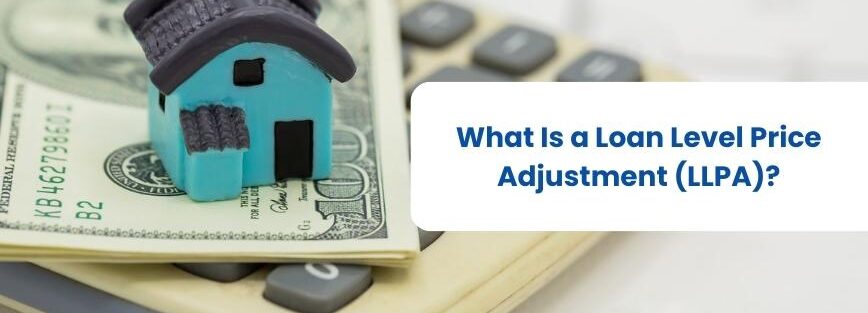Unveiling Loan Level Price Adjustment (LLPA) in Mortgage Financing
In the intricate landscape of mortgage financing, Loan Level Price Adjustment (LLPA) emerges as a critical factor shaping borrowers’ financial landscapes. As we delve into the depths of LLPA, we illuminate the nuances that every homeowner or potential buyer must comprehend.
Understanding LLPA: What is Loan Level Price Adjustment?
Loan Level Price Adjustment, or LLPA, is a sophisticated system in conventional mortgage financing designed to assess risk and safeguard lenders against potential financial pitfalls. This risk-based fee mechanism takes into account various factors such as credit score, loan-to-value ratio, debt-to-income ratio, and loan type to determine the borrower’s overall risk profile.
When borrowers opt for a conventional mortgage, LLPA comes into play. This additional fee is added to the interest rate of the loan, influencing the overall mortgage payment. The complexity lies in the fact that LLPA is not a one-size-fits-all concept; its impact varies based on individual borrower characteristics.
Demystifying LLPA: What is Loan Level Price Adjustment?
Unraveling the mystery of LLPA involves recognizing its role as a risk management tool. Initially introduced by Fannie Mae and Freddie Mac, LLPA allows lenders to offer a broader spectrum of mortgages. However, this expansion comes with a caveat — a careful calibration of interest rates based on the perceived risk associated with the borrower.
Simply put, LLPA ensures that borrowers deemed ‘riskier’ contribute more to mitigate potential losses, safeguarding those with a more favorable risk profile. This intricate dance between risk and cost underscores the need for borrowers to comprehend the multifaceted nature of LLPA when navigating mortgage options.
How is an LLPA Calculated?
The calculation of LLPA is a meticulous process, with lenders scrutinizing multiple facets of a borrower’s financial profile. The primary determinants include credit score, loan-to-value ratio, and debt-to-income ratio. However, the devil is in the details, as other characteristics, such as the nature of the loan (investment property, multi-unit home, cash-out refinance), also factor into the equation.
Lenders assign varying weights to these criteria, and the cumulative assessment guides the application of LLPA. It’s crucial to recognize that LLPA is not a binary system; rather, it operates on a spectrum where borrowers may exhibit one or more risk characteristics, each influencing the final adjustment.
Do LLPA’s Apply to All Loans?
LLPAs are exclusive to conventional loans and do not cast their influence on other mortgage types such as FHA, VA, or USDA loans. For those opting for a conventional loan, especially in scenarios involving multi-unit homes, lower down payments, or lower credit scores, LLPAs become a tangible consideration.
In essence, the application of LLPA is a strategic move by lenders to align risk and cost, ensuring a balanced approach to mortgage financing. Borrowers must be cognizant of this intricate fee structure, as it significantly influences the overall cost of their home loan.
As the mortgage landscape evolves, LLPA remains a pivotal component in the borrowing journey. By comprehending its intricacies, borrowers can navigate the financial terrain with confidence, making informed decisions that align with their unique circumstances and financial goals.
2023 Changes in Loan Level Price Adjustment
The financial landscape is ever-evolving, and 2023 brought notable changes to the realm of Loan Level Price Adjustment (LLPA). These adjustments were not mere tweaks; they were a strategic response to economic shifts, aiming to strike a delicate balance between fairness for borrowers and risk management for lenders.
The alterations, effective from May 1, 2023, introduced a nuanced approach to LLPA, particularly influencing interest rates based on borrowers’ financial standings. For those with lower credit scores, the impact of these changes was substantial. The revamped LLPA fee structure sought to reduce closing costs for lower-income households, thereby enhancing affordability.
This dynamic shift underscores the adaptive nature of the mortgage industry, responding to economic dynamics to ensure a more equitable lending environment.
The Impact of LLPA on Borrowers
Understanding the impact of Loan Level Price Adjustment (LLPA) on borrowers is crucial for anyone navigating the complexities of mortgage financing. LLPA introduces an additional layer of cost, directly influencing the affordability of a home loan.
Borrowers, especially those with risk factors such as lower credit scores or unconventional loan scenarios, may find themselves subject to higher LLPA adjustments. The increased cost can be a significant consideration when budgeting for a mortgage, affecting the overall financial picture.
It’s imperative for borrowers to not only be aware of the existence of LLPA but also to factor it into their financial planning. By doing so, they can make informed decisions, ensuring that their chosen mortgage aligns with their budgetary constraints and long-term financial goals.
Working with Expert Mortgage Loan Officers
Navigating the intricacies of LLPA and the broader mortgage landscape can be a daunting task. This is where the expertise of mortgage loan officers comes into play. Working with seasoned professionals, especially those with a wealth of experience like Enterprise America’s mortgage loan officers, can make a substantial difference in the borrower’s journey.
Expert mortgage loan officers possess the knowledge to interpret LLPA implications based on individual circumstances. They guide borrowers through the maze of loan options, helping them understand how LLPA fits into the overall cost structure. This personalized approach ensures that borrowers not only secure a mortgage but also make a well-informed decision aligned with their unique financial situation.

Frequently Asked Questions:
Q: What is a loan level price adjustment or LLPA?
A: A Loan Level Price Adjustment (LLPA) is a fee assessed by lenders on conventional mortgages, determined by factors such as credit score, loan-to-value ratio, and debt-to-income ratio. It’s a risk-based fee that can influence your mortgage interest rate, impacting the overall cost of your loan.
Q: What is a loan transaction adjustment?
A: A loan transaction adjustment is a modification to the terms of a mortgage that can affect the cost of the loan. This adjustment is often influenced by factors such as the type of loan, the borrower’s credit score, and the loan amount. It’s essential to understand these adjustments to make informed decisions during the mortgage process.
Q: What are the changes to the LLPA fee?
A: Changes to the LLPA fee typically refer to adjustments in the cost structure of conventional mortgages. These modifications, which can occur over time in response to economic conditions, may impact interest rates based on borrowers’ financial situations. Staying informed about these changes is crucial for understanding the evolving landscape of mortgage financing.
Q: What is the difference between discount points and LLPA?
A: While both discount points and LLPA influence mortgage costs, they operate differently. Discount points are fees paid upfront to lower the interest rate, directly affecting monthly payments. On the other hand, LLPA is a risk-based fee assessed by lenders based on various borrower factors, impacting the interest rate and overall cost of the loan. Understanding these distinctions is key to making informed decisions in the mortgage process.
Conclusion
In conclusion, as we navigate the dynamic landscape of mortgage financing, the significance of understanding Loan Level Price Adjustment (LLPA) cannot be overstated. The 2023 changes underscore the industry’s commitment to adaptability, balancing the needs of borrowers and lenders.
The impact of LLPA on borrowers goes beyond a mere financial consideration; it becomes a crucial factor in shaping the trajectory of their homeownership journey. As borrowers weigh the costs and benefits, seeking the guidance of expert mortgage loan officers emerges as a wise strategy.
At Enterprise America, we recognize the evolving nature of mortgage financing. Our seasoned mortgage loan officers stand ready to assist you in navigating LLPA and finding the optimal mortgage solution tailored to your unique circumstances. Your financial journey is our priority, and we are here to ensure it is a seamless and informed experience.




